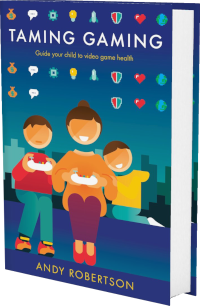 Android
Android iOS
iOS Mac
Mac Switch
Switch Wii
Wii Wii U
Wii U PC
PC PS4
PS4 PS5
PS5 Xbox One
Xbox One Xbox X|S
Xbox X|S17/06/2021 07:48:36 2 years ago Author: Andy Robertson
‘If you’re worried about video games’ effects on children, why not just keep them out of the house?’ … ‘You wouldn’t leave your child with a bottle of vodka in their room, so why a video game?’ … ‘It’s simple, read the age ratings and just say no!’ … ‘Just limit them to an hour a day if they’ve done their homework and chores.’ … ‘Say no to the brats.’ … ‘Don’t let games rewire your child’s brain.’
I’ve heard this advice in many contexts: waiting at the school gate; from the ITV Good Morning couch; at dinner parties; in radio interviews; on Facebook support groups. Strong parents of younger children see games as something to control, like you would an addictive substance. Worried parents of teenagers bemoan not instigating stronger screen discipline in younger years.
These kinds of answers sound good: taking back control; limiting screen time; monitoring behaviour against bad habits; not welcoming a technological monster into the home. But the short-term respite fails to help parents develop a sustainable strategy. More importantly, it fails to help children develop a healthy relationship with the digital world. It is advice and thinking that stem from a misunderstanding of what video games are, and the role they play in a child’s life. A combination of worrying headlines about extreme gaming and intentionally addictive design along with books suggesting that games permanently change children’s brains make it seem obvious that we must guard against these experiences.
It’s a pattern we see each time a new form of mass entertainment is created, particularly one embraced primarily by children. Rather than being a normal, somewhat inevitable, facet of childhood, video games are seen as a special case compared to other media. It’s assumed that we need special measures to resolve parents’ impotence in the face of such a powerful force. They become a problem to solve rather than a pastime needing parental guidance.
Harold Schechter, a professor of literature at Queens College in New York City, highlights the phenomenon of this response to new media in his book Savage Pastimes. ‘Very quickly, high-minded reformers begin to denounce the new medium as a sign of social decay … a corrupter of the young’. Tellingly, Schechter highlights that the panic stops not when the medium has been brought under control in some way, but when newer, more exciting technology means the ‘onetime media menace comes to be looked at nostalgically as a harmless, old-fashioned form of play. In retrospect, moreover, it is clear that – for all the hysteria of the moment – none of the dire predictions came true.’
It’s helpful to acknowledge that in the future parents and carers will look back nostalgically at online video games and ask why children don’t play like that any more, in light of some new scary technology.
This isn’t to say we shouldn’t pay attention to the media our children are consuming. In fact, we should pay closer attention so we can better understand what’s really happening beyond any moral panic. But this needs to go beyond simplistic limits over screen time or prohibitions around violence and spending.
Whether or not a moral concern is warranted, the real danger is that this puts parents off engaging in that area of their children’s lives. The more we stigmatise video games as being only addictive, powerful and coercive, the more this self-perpetuating cycle continues. Blanket advice to quit, ban and limit video games further removes them from normal family life.
This pushes video games out of our sphere of parental influence and leaves children to game without our guidance, interest or appreciation. Inevitably, games then compete with, and draw children away from, other family activities. Perhaps worst of all, this muddled approach makes it hard for parents to identify the real cause of problems that children might exhibit while playing.
Don’t worry, though; there is another way to deal with this that doesn’t alienate children or demonise video games. It probably still sounds absurd to suggest that busy parents spend time playing video games. But this will sound less crazy as we get a better understanding of what games are and why children play them. We need to understand the content video games offer, the craft players need to play them, the context in which they are played – and how they relate to other parts of childhood.
Along with the content, craft and context of our children’s gaming, the final piece of the puzzle is understanding how games relate to other important things in their lives.
Jordan Shapiro is a professor who works on global policy and education. In his book The New Childhood he suggests that creating a sense of belonging for children is no longer just about mealtimes, displaying important family pictures or having grandparents’ furniture around the home. We must also ‘make an intentional effort to inject an ethical education into emerging technology contexts’. Developing digital family traditions and sharing important moments both online and offline helps children navigate a blended online-offline world as they mature.
Games offer a unique opportunity to practise these skills in safe and innovative ways. As Andrew Przybylski highlighted in the Oxford Internet Institute London Lecture ‘Screen Time – Myths, Misconceptions and Making Sense of it All’, ‘Screens, games and social media are the royal road into the internal and behavioural lives of young people today. They are an opportunity to be out ahead of your young person.’
“All behaviour is communication,” writes parenting psychotherapist Phillipa Perry in her The Book You Wish Your Parents Had Read. “Your job is to decipher your child’s behaviour. Rather than dividing our children up into ‘good’ bits and ‘bad’ bits, there are questions you need to ask. What is their behaviour trying to say? Can we help them communicate in a more convenient way? What are they telling us with their bodies, with their noises, and with whatever words they choose to us?” What are they telling us with their video game playing?
Rather than limiting their digital world in an effort to squeeze out the new in favour of how our childhoods used to be, we can root and tether video games as part of family life so children learn to navigate their connected world healthily and robustly. Shapiro writes, ‘We must teach children the values, rules, and etiquette necessary to referee a fair fight between scale and intimacy, to maintain an honor code and reinforce the chivalrous ethics of participation.’
Achieving this is as simple as watching and playing games together so they become one of the things the family does. This is a good way to create a healthy balance for video games in our children’s lives as it naturally brings them under the same considerations and comparisons as other things we enjoy doing. This may lead to a reduction of play time, but equally, it may escalate the activity in new, more positive and ambitious directions.
i This article was first published in the Taming Gaming book.
© 2024 Family Gaming Database












